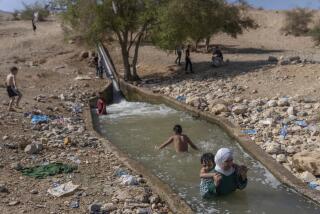Israel, Jordan and Palestinians sign accord on water cooperation
JERUSALEM -- In a rare example of regional cooperation, Israeli, Palestinian and Jordanian officials have signed an agreement aimed at generating new water sources for all three and saving the Dead Sea, a unique nature site and prime economic asset.
A memorandum of understanding was signed at the World Bank headquarters in Washington on Monday by the ministers responsible for water in the three governments: Silvan Shalom of Israel, Hazem Nasser of Jordan and Shaddad Attili of the Palestinian Authority.
All three praised the agreement as historic and a sign of practical cooperation on shared interests, although their comments reflected nuances.
The agreement will help save the Dead Sea; supply water and later electricity; and bring about “strategic, economic and political cooperation,” said Shalom, who said he hoped it would serve as a “window for regional peace.”
Stressing that the agreement was unrelated to the 1993 Oslo peace accords that once served as a framework for negotiations between Israelis and Palestinians, Attili said the common goal of saving the Dead Sea proved everyone could work together “despite political issues and the conflict.”
Currently only Israel and Jordan have access to the Dead Sea and the resources it offers. However, the Palestinians expect access in an eventual peace accord with Israel and are seeking to protect a future asset.
The Jordanian minister stressed that the agreement was not political and would help ease the area’s water crisis, addressing concerns both humanitarian and ecological.
Increasing the amount of available water and reducing its price is a standing concern in Jordan, where resources are now further strained by hundreds of thousands of Syrian refugees living in the small kingdom.
A desalination facility planned for late 2014 in Aqaba, Jordan, on the Red Sea will produce up to 100 million cubic meters of drinking water a year, enough to cover Jordan’s need for affordable water for the next decade, Nasser said.
Jordan and Israel will share the water, and Israel will release more water from the Sea of Galilee for use in Jordan and will sell the Palestinians desalinated water for use in the West Bank as part of the deal.
Nasser said the physical project is “a totally Jordanian” one, with all facilities built on Jordanian soil and run by the government, which will try to secure the $900 million needed for the first phase from grants.
In addition to the desalination facility, a 112-mile pipeline would convey brine from the Aqaba plant to partially replenish the shrinking Dead Sea, a hyper-saline body of water.
The level of the Dead Sea is dropping by 4 feet a year, representing an annual loss of about 1.6 billion cubic meters. The water line is receding rapidly, threatening the unique site and the tourism industries built around it, as well as ravaging the environment with unsightly and dangerous sinkholes.
Environmentalists are highly concerned about mixing Red Sea and Dead Sea waters, and warn that upsetting the Dead Sea’s unique chemistry and delicate ecosystem could result in floating gypsum crystals and red algae blooms that would discolor its blue waters. Additional concerns involve damage to coral reefs in the Red Sea and contamination of groundwater in Israel’s Arava desert.
The agreement also faces political objections from Palestinian groups. In October, some called to for the rejection of the project, saying it undermined Palestinian water rights and legitimized their dispossession from the Jordan River.
Monday’s agreement involves the first stage of an updated version of the Red Sea-Dead Sea conduit plan, which has been mulled in various forms for decades, with the potential to grow into a far larger project that could include creating artificial lakes and generating electricity.
Meanwhile, the first pipeline through Jordanian territory will take about three years to complete once a tender is published next year, Israeli officials said.
ALSO:
Venezuela’s ruling socialists survive electoral test
Russia: Putin dissolves, replaces Soviet-era news agency
Agency ridding Syria of chemical weapons warns deadline to be missed
Sobelman is a news assistant in The Times’ Jerusalem bureau.
.
More to Read
Sign up for Essential California
The most important California stories and recommendations in your inbox every morning.
You may occasionally receive promotional content from the Los Angeles Times.










